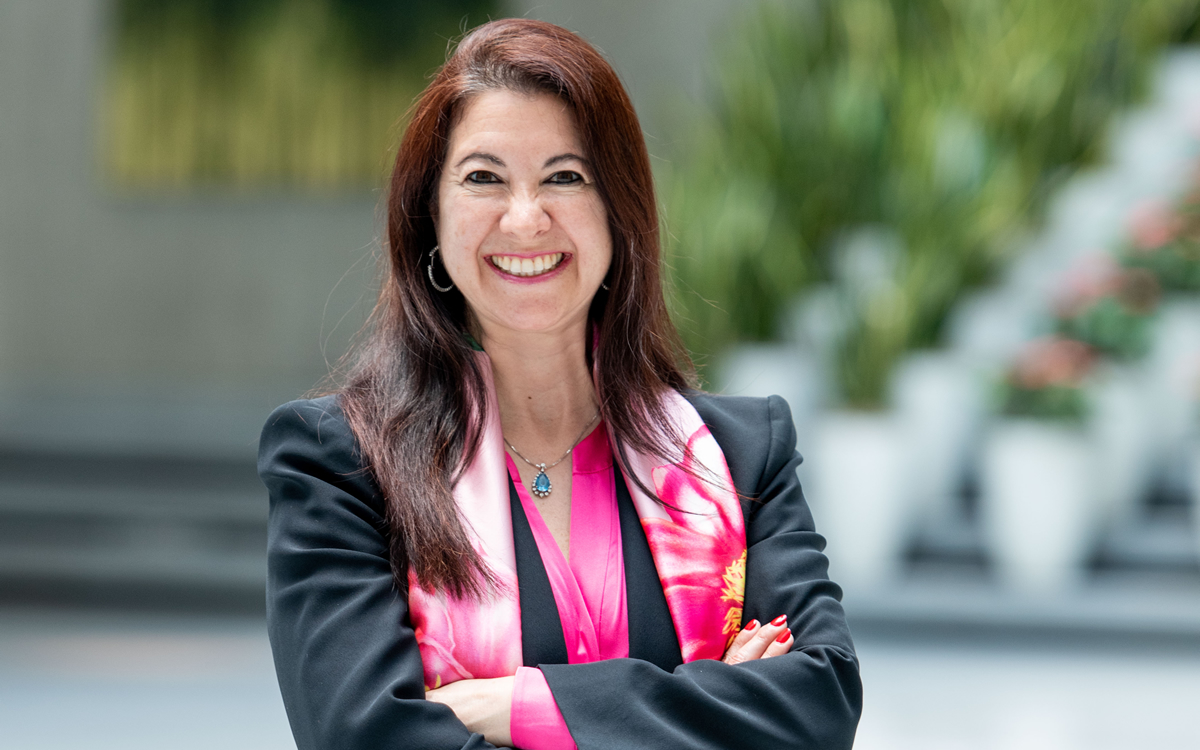The White House
World Bank’s U.S. executive director reaffirms ‘strong commitment’ to LGBTQ, intersex people
Adriana Kugler spoke exclusively with Washington Blade on Feb. 13

The U.S. executive director of the World Bank Group told the Washington Blade last month during an exclusive interview that she is committed to LGBTQ and intersex rights.
“As U.S. executive director, I certainly have a strong commitment, not only representing the U.S., but myself to advocate for inclusive development to address the needs of LGBTQI persons,” said Adriana Kugler during an interview at her D.C. office on Feb. 13.
Kugler, who was born in Colombia, has been in the position since May 2022. She is the first Latina woman named to the post.
Kugler was chair and chair-elect of the American Statistical Association’s Business and Economics Statistics Section in 2020 and 2019 respectively. She from 2019-2022 was a member of the National Academies of Sciences, Engineering and Medicine’s Board on Science, Technology and Economic Policy and was on the Bureau of Labor Statistics’ Technical Advisory Committee from 2016-2019.
Kugler was a chief economist at the U.S. Labor Department from 2011-2013. She has also been a professor of public policy and economics at Georgetown University since 2010, although she is currently on leave.
2021 presidential memo committed U.S. to promoting LGBTQ, intersex rights abroad
Kugler noted the Biden-Harris administration “have a strong commitment to promote inclusion of LGBTQI+ individuals.”
“This has been a priority,” she said, noting a number of executive orders and memorandums the administration has issued since it took office in 2021. One of them committed the U.S. to promoting LGBTQ and intersex rights abroad as part of the White House’s overall foreign policy.
“That’s been definitely a driving force, understanding that multilateral engagement is really very important in terms of driving protections of LGBTQI persons around the world,” she said.
Kugler told the Blade one of her priorities has been to support the collection and dissemination of data that “can really help to drive support and drive demand for LGBTQ inclusion here at the bank.”
“That’s been one of my priorities, to support data efforts,” she said. “It has been a priority for the U.S. as well, and that has been something that I have put forward very firmly.”
Kugler last November held an “inaugural meeting with management board members and CSOs (civil society organizations) to discuss LGBTQI+ inclusion priorities.” M. V. Lee Badgett, a professor economics at the University of Massachusetts-Amherst who co-directs its Center for Employment Equity, at the gathering presented information that showed the economic benefits of LGBTQ and intersex inclusion.
“That, I think, is a driver that can really help us make the case, just the same way we did it back in the day to drive support for gender equality in the multilateral organizations,” said Kugler. “I really believe in that.”
Kugler added the meeting was held to “restart the conversation, to prioritize inclusion of LGBTQ people and to make sure people understand the economic case for that.”
A specific issue on which Kugler has worked is “making sure that the standards of evidence for misconduct, for cases of misconduct, are coherent with the standards of evidence that we have here in the U.S. and that we have for cases of sexual harassment, as well as for cases of sexual misconduct.”
“That’s the prepondence of the evidence standard, as opposed to the clear and convincing evidence standard that is a very high standard to meet,” said Kugler. “So we’re making sure we work towards making progress so that cases are brought forward by those who suffer from harassment and to make sure that they have a voice and have a chance to make their cases.”
Kugler said another priority “is to engage really closely with colleagues in” GLOBE, a resource group for the World Bank’s LGBTQ and intersex employees. Kugler said a key priority “is to support, especially those LGBTQ staff who work abroad, either in those situations where being LGBTQ is criminalized, or where its a very unfriendly environment, even when it’s not criminalized.”
She told the Blade that it is important to ensure the World Bank “offers protections” for LGBTQ and intersex employees in countries with anti-LGBTQ and anti-intersex rights records. Kugler also said that it is particularly important to offer same-sex spouses and partners the opportunity to access jobs through World Bank offices and local staff in places where they would not be able to work elsewhere and to train local staff on LGBTQ and intersex issues to provide a safe workplace.
An example of an LGBTQ-inclusive project the board recently approved is the World Bank International Finance Corporation’s $275 million loan to Banco Davivienda in Colombia, which provides funding for advisory services to LGBTQ and intersex people and for the design of LGBTQ and intersex banking products.
The World Bank’s EQOSOGI Project has already collected LGBTQ- and intersex-specific data on legal gaps as well as practices that impact LGBTQ and intersex people in 16 countries, and it aims to expand its coverage to more countries in 2024. The EQOSOGI Project is also expanding its research to quantify the economic costs of excluding LGBTQ and intersex people, starting with Serbia and North Macedonia.
“We know the queer community is suffering very adverse consequences there, and it makes sense to have a legal mapping to understand the conditions on the ground that the queer community faces and to make sure that we protect — and at least — recommend anti-discriminatory practices,” said Kugler.

She added she asks questions to her fellow board members “as far as standards and protections for projects in those contexts where the LGBTQI community is criminalized, so that we are sure that those communities have a voice when the bank comes in, if anything goes wrong.”
“We are very strong on that,” said Kugler. “We will continue to support communities and all communities, including the queer community, to be heard if anything goes wrong so that we can make sure that they are widely protected.”
“This will also send a message to these countries that at some point they have to start considering legal changes,” she added. “It starts with raising the issue in front of the rest of the board, all of the world, that these issues of inclusion should be lifted up and they need to be rethinking their legal framework.”
Then-World Bank President Jim Yong Kim in 2014 postponed a $90 million loan to the Ugandan government in response to President Yoweri Museveni’s decision to sign the Anti-Homosexuality Act, which imposed a life sentence upon anyone found guilty of repeated same-sex sexual acts.
The Ugandan Constitutional Court later struck down the “Kill the Gays” law on a technicality, but Kim’s decision to postpone the loan without first consulting the World Bank’s board sparked widespread criticism among board members. Advocacy groups had asked the World Bank not to fund future projects in Uganda, but they did not ask for the cancellation of existing loans.
“We are all very aware of the Uganda case that went wrong,” Kugler told the Blade.
“We’re absolutely firm as part of the World Bank Group’s work and as the U.S. chair that we will protect anybody, to make sure that our projects not only do more good than bad, but that they actually do no harm,” she added. “They shouldn’t be harming communities and they should certainly not be harming LGBTQI communities around the world.”
Kugler acknowledged the World Bank still does not have LGBTQ-specific safeguards, but she added it “is something that is still being discussed.”
The Treasury Department last May endorsed an LGBTQ-specific Asian Development Bank safeguard. The Office of the U.N. High Commissioner for Human Rights is among the organizations that have also backed it.
Chantale Wong, the U.S. director of the Asian Development Bank who is the first openly lesbian American ambassador, last fall told the Blade the Biden-Harris administration continues to push for the Philippines-based ADB to implement the safeguards. Kugler — who described Wong as “an amazing advocate” — noted the World Bank will soon release its new Gender Strategy that will include a nonbinary approach to gender.
“It is helpful when the CSO community engages in these processes, because they help us to lift up these issues with the management of the bank as well,” said Kugler.
“The voices from outside help put pressure … on the countries themselves and how the board proceeds,” she added.
The White House
White House has ‘no plans’ to recognize Pride month
President Donald Trump acknowledged LGBT people in 2019 tweet

White House Press Secretary Karoline Leavitt on Tuesday said that President Donald Trump has “no plans” to recognize Pride month in 2025, a departure from policy and practice under the Biden-Harris administration.
“There are no plans for a proclamation for the month of June,” she said during a press briefing at the White House, “but I can tell you this president is very proud to be a president for all Americans, regardless of race, religion or creed.”
Trump during his first term declined to acknowledge the observance apart from a tweet in 2019 in which he wrote, “As we celebrate LGBT Pride month and recognize the outstanding contributions LGBT people have made to our great nation, let us also stand in solidarity with the many LGBT people who live in dozens of countries worldwide that punish, imprison, or even execute individuals on the basis of their sexual orientation.”
Democratic Former Presidents Bill Clinton and Barack Obama issued Pride month proclamations, and while Trump was the first Republican president to do so, his second term has seen a whole-of-government effort to restrict the rights of LGBTQ people.
Notably, given the president’s 2019 message about his administration’s work combatting the criminalization of queer people in countries overseas, so far those efforts have been stymied and defunded across the board since his return to the White House.
Anti-LGBTQ U.S. Rep. Mary Miller (R-Ill.) introduced a resolution on Tuesday that would establish June as “Family Month,” which she said would “reject the lie of ‘Pride’ and instead honor God’s timeless and perfect design.”
“The American family is under relentless attack from a radical leftist agenda that seeks to erase truth, redefine marriage and confuse our children,” the congresswoman told the Daily Wire.
The White House
Trump travels to Middle East countries with death penalty for homosexuality
President traveled to Saudi Arabia, Qatar, and United Arab Emirates

Homosexuality remains punishable by death in two of the three Middle East countries that President Donald Trump visited last week.
Saudi Arabia and Qatar are among the handful of countries in which anyone found guilty of engaging in consensual same-sex sexual relations could face the death penalty.
Trump was in Saudi Arabia from May 13-14. He traveled to Qatar on May 14.
“The law prohibited consensual same-sex sexual conduct between men but did not explicitly prohibit same-sex sexual relations between women,” notes the State Department’s 2023 human rights report, referring specifically to Qatar’s criminalization law. “The law was not systematically enforced. A man convicted of having consensual same-sex sexual relations could receive a sentence of seven years in prison. Under sharia, homosexuality was punishable by death; there were no reports of executions for this reason.”
Trump on May 15 arrived in Abu Dhabi, the capital of the United Arab Emirates.
The State Department’s 2023 human rights report notes the “penalty for individuals who engaged in ‘consensual sodomy with a man'” in the country “was a minimum prison sentence of six months if the individual’s partner or guardian filed a complaint.”
“There were no known reports of arrests or prosecutions for consensual same-sex sexual conduct. LGBTQI+ identity, real or perceived, could be deemed an act against ‘decency or public morality,’ but there were no reports during the year of persons prosecuted under these provisions,” reads the report.
The report notes Emirati law also criminalizes “men who dressed as women or entered a place designated for women while ‘disguised’ as a woman.” Anyone found guilty could face up to a year in prison and a fine of up to 10,000 dirhams ($2,722.60.)

Trump returned to the U.S. on May 16.
The White House notes Trump during the trip secured more than $2 trillion “in investment agreements with Middle Eastern nations ($200 billion with the United Arab Emirates, $600 billion with Saudi Arabia, and $1.2 trillion with Qatar) for a more safe and prosperous future.”
Former President Joe Biden traveled to Saudi Arabia in 2022.
Saudi Arabia is scheduled to host the 2034 World Cup. The 2022 World Cup took place in Qatar.
The White House
Trump nominates Mike Waltz to become next UN ambassador
Former Fla. congressman had been national security advisor

President Donald Trump on Thursday announced he will nominate Mike Waltz to become the next U.S. ambassador to the U.N.
Waltz, a former Florida congressman, had been the national security advisor.
Trump announced the nomination amid reports that Waltz and his deputy, Alex Wong, were going to leave the administration after Waltz in March added a journalist to a Signal chat in which he, Defense Secretary Pete Hegseth, and other officials discussed plans to attack Houthi rebels in Yemen.
“I am pleased to announce that I will be nominating Mike Waltz to be the next United States ambassador to the United Nations,” said Trump in a Truth Social post that announced Waltz’s nomination. “From his time in uniform on the battlefield, in Congress and, as my National Security Advisor, Mike Waltz has worked hard to put our nation’s Interests first. I know he will do the same in his new role.”
Trump said Secretary of State Marco Rubio will serve as interim national security advisor, “while continuing his strong leadership at the State Department.”
“Together, we will continue to fight tirelessly to make America, and the world, safe again,” said Trump.
Trump shortly after his election nominated U.S. Rep. Elise Stefanik (R-N.Y.) to become the next U.S. ambassador to the U.N. Trump in March withdrew her nomination in order to ensure Republicans maintained their narrow majority in the U.S. House of Representatives.
-

 U.S. Supreme Court3 days ago
U.S. Supreme Court3 days agoSupreme Court upholds ACA rule that makes PrEP, other preventative care free
-

 U.S. Supreme Court3 days ago
U.S. Supreme Court3 days agoSupreme Court rules parents must have option to opt children out of LGBTQ-specific lessons
-

 India5 days ago
India5 days agoIndian court rules a transgender woman is a woman
-

 National4 days ago
National4 days agoEvan Wolfson on the 10-year legacy of marriage equality












